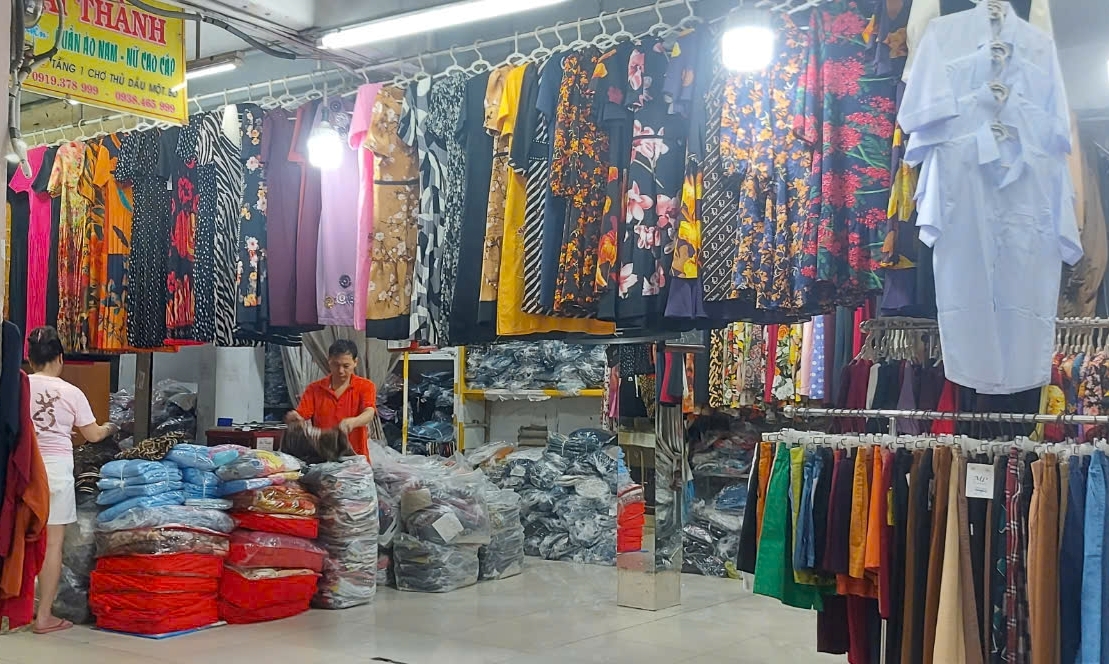Traditional market diversifies business lines to develop
In the trend of strong development of e-commerce nowadays, supermarkets, shopping centers, markets in urban centers with large scale maintain their position thanks to modern infrastructure, flexible business forms. However, in small and medium-sized markets, local markets are facing many challenges to maintain operations. Binh Duong province has and is implementing many solutions to address this issue.

A clothing store operates at Thu Dau Mot market
Challenges facing off
Survey at Thu Dau Mot market, Cho Dinh market in Thu Dau Mot city, shows that clothing stalls, shoes, cosmetics, accessories, although vendors still update new models and reasonable prices, are still in a state of lack of customers. Ms. Nguyen Vu Nha Truc, a clothing vendor at Thủ Dầu Một market, said that in the past, the market was always bustling with buyers and sellers creating a lively trading atmosphere, but nowadays there are very few customers coming to the market. The cause is that the trend of consumer shopping is changing too fast, people are gradually preferring to shop online, on social media platforms because this form is fast delivery, home delivery, diverse types, all price levels... Currently, at traditional markets, only fresh food items are still quite crowded for shopping.
One more difficulty for traditional markets is that the majority of small traders are quite old, when we mention the issue of understanding to combine with e-commerce, many people say they are not familiar with selling online, advertising products.
The reality shows that traditional commerce and e-commerce have distinct differences. For traditional commerce, customers interact directly with the product, check the quality, but this type has higher costs because of renting premises and sales staff. Electronic commerce has lower operating costs, can operate 24/7, but customers cannot experience products directly. To maintain operations, traditional commerce needs to change, typically digitizing operations and transitioning to a hybrid model of online and direct sales.
Timely changes for development
Mrs. Phan Bich Thao, owner of a clothing and cosmetics store in Phu Loi ward, Thu Dau Mot city, said that in order for the store to survive, she quickly became familiar with e-commerce, posted products on e-commerce websites, utilized social networking sites such as Facebook, Zalo, and websites to reach and expand customers. Thanks to that, recently the store's sales have improved and maintained stable operations.
Currently, in Binh Duong, many commercial enterprises have built websites and participated in the province's e-commerce platform such as https://binhduongtrade.vn/, various types of e-commerce such as B2B (business to business), B2C (business to customer). It can be seen that the combination of traditional and modern business models will create a diverse business environment, a flexible business ecosystem that better meets the needs of the people.
To keep up with the trend of e-commerce development, Binh Duong is focusing on investing in digital infrastructure and encouraging banks to connect electronic payment systems. Binh Duong aims by 2030, 100% of markets to adopt cashless payments, moving towards comprehensive digital transformation; over 80% of businesses and 60% of households engaged in e-commerce platforms. The province's e-commerce platform will be upgraded to facilitate cross-border transactions, boost exports, and enhance international trade exchanges.
Mrs. Phan Thi Khanh Duyen, Deputy Director of the Department of Industry and Trade, said that in the coming time, the industry and trade sector will implement a series of solutions to develop and modernize the market system. Specifically, the planning and development of markets will be promoted with the encouragement of social investment, focusing on upgrading traditional markets into modern models with full support services. Besides that, the industry and trade sector will support training digital commerce skills for small traders; guide the construction of civilized commercial market models, market of 4.0 versions, and support small traders in expanding sales channels on e-commerce platforms. The industry and trade sector also encourages the development of tourism markets, such as night markets, community markets etc.
According to the planning, by 2030, Binh Duong will have 114 markets, 46 supermarkets, and 41 commercial centers. With the orientation of combining traditional commerce and e-commerce, Binh Duong is actively coordinating with localities to implement the digital transformation of traditional markets.
Reported by Tuan Anh – Translated by Vi Bao

